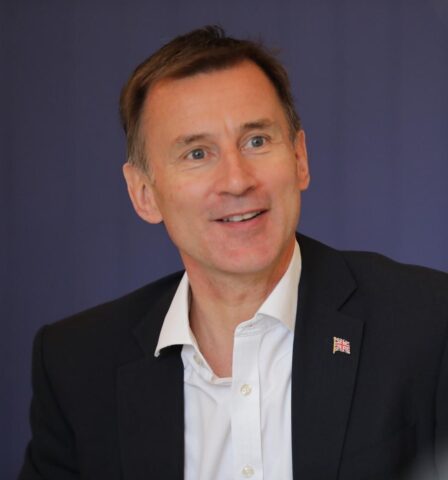For Sir Jeremy Hunt, future of British politics uncertain but salvageable
British politician and former Chancellor and Foreign Secretary, Sir Jeremy Hunt, will be presenting his book ‘Can We Be Great Again? Why a dangerous world needs Britain’ during his talk at the Gibraltar Literary Festival on November 15 at the John Mackintosh Hall. His book argues that in an increasingly volatile world Britain still holds the capacity to lead and influence global affairs. Sir Jeremy spoke to Features Editor Gabriella Ramagge about the changing political landscape.

What inspired this book, and why publish now at a time that you recognise has been a difficult period for Britain?
I first started writing this book not long after my time as foreign secretary – which had been a very formative experience and really opened my eyes to how positively Britain is viewed on the world stage. In a way, this is the book I wish I had been given when I started the job. I published this book because I want to give Britian a confidence boost. For too long, popular discourse has been dominated by declinists who believe our best days are behind us.
What do you think are Britain's biggest strengths, and how do you think Britain will be able to continue to be influential in this global climate?
Our biggest strengths are our robust democratic and legal institutions, our competitive finance and technology sectors, as well as our world-class universities. On the global stage, we also still retain considerable convening power, which allows us to exert considerable influence internationally.
Looking back at your time as Chancellor and Foreign Secretary, in your view what reforms need to be made?
My priorities domestically would be further planning reforms to get us building again, and welfare reform to get those trapped on benefits working again. These two sets of reforms would do wonders for our economy and standard of living. I would also like to see more emphasis placed on promoting and protecting democratic principles abroad, as well as more confidence to stand up to pressure and reject demands to give up our sovereignty, like what should have happened with the Chagos islands.
Trump's Liberation Day tariffs resulted in last minute changes to the book, what's your analysis of Trump's second term and how it differs from his first in terms of relations with the UK?
President Trump’s second term in office has changed the way the game of international politics is played. The Liberation Day tariffs showed the world that he has not been making idol threats. This had an immediate effect on the behaviour of other countries, with one example being NATO countries finally agreeing to increase their target for defence spending. Trump tried to get NATO to spend more on defence during his first term but failed, despite first threatening and then nearly withdrawing the US from NATO altogether. For the UK, we enjoyed good relations with the US during Trump’s first term and continue to do so now. But with more emphasis on ‘America first’ during his second term, the UK has had to invest a lot more political capital than before to maintain the relationship.
In a changing political climate, with new parties entering the fold. In your view, what is the future of democracy in the UK?
I have been very concerned about the increasing divisiveness in politics in the UK – which has been egged on by social media platforms seeking more engagement. And we are right to be concerned about the rise of populism and civic unrest, both of which pose a massive threat to our democratic institutions. However, there is still time for the mainstream parties to salvage the situation, but only if we get better at delivering what we promise to the electorate. Trust in politics can be restored, but it won’t be easy. So the future is uncertain, but I am optimistic that we can turn it around.









